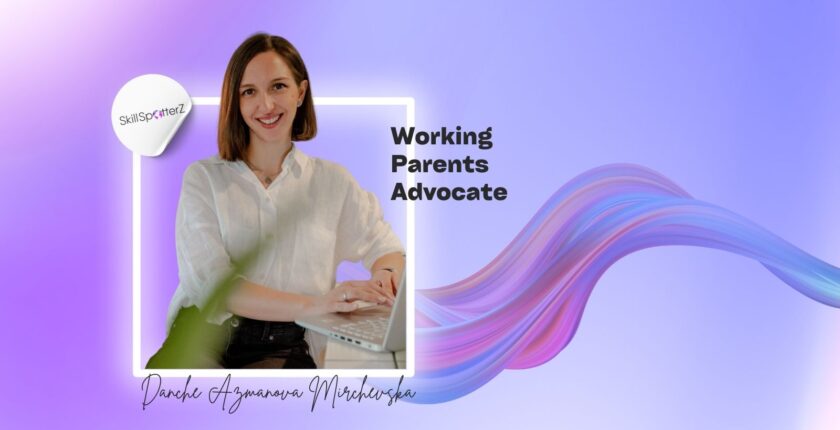Freelancing Moms: What Every Working Mom Needs to Know to Start or Thrive
Meet Danche, a freelancing mom- successfully working and growing her businesses- and sharing her reality with you.

This month’s spotlight is on Danche, a Working Parents Advocate and a Founder of wokringmom.mk
Being a mom doesn’t mean pressing pause on your career-it means rewriting the rules.
Danche, founder of the Working Mom platform, has turned her own struggles and victories into a mission: to help workplaces truly understand and support parents.
Through workshops, personal stories, and practical strategies, she’s showing companies and mothers alike how empathy, flexibility, and self-care can fuel both productivity and happiness.
Check out Danche here and learn about all other things she has been working on the side.
At SkillSpotterZ, we spotlight creative minds like Danche, in order to help Companies and Remote Talent grow together and hear real talk and insights about the industry.
💬 Who is Danche — beyond the titles, the businesses, the ‘mom’ role?
Who are you when no one is watching?
When no one is watching, I go around the city streets and feed homeless dogs and cats.
For me, this isn’t just about providing a meal to them.
It’s more like a selfless ritual that recharges my spirit and reminds me of what’s truly important.
And in those moments of quiet kindness where I watch their happy faces, I find the energy to face my own challenges.
The Voice Behind Working Mom MK.
You created Working Mom MK as a response to something very personal — a lack of honest, relevant resources for mothers navigating careers.
💬 Can you take us back to the moment you realized: “I need to build this”? What was missing from the conversation around working mothers that you wanted to change?
When I became pregnant, I immediately started scouring the internet for resources. I wanted guidance on how to juggle work while pregnant and navigate the early days of motherhood. On top of that, a fear crept in: would I even be able to handle this new role? I knew a classic maternity leave wasn’t in the cards for me.
I found nothing but generic, copy-pasted advice, so I decided to create what I was looking for. With my decade of content creation experience, I set out to build a platform for future moms. But impostor syndrome hit hard. For eight months, I’d hesitate to publish, thinking, “Who would care?” It felt so contradictory, given that my content for other companies had reached millions.
I launched the “Working Mom” platform as a personal blog—a space for a mom who wanted the best of both worlds. I never imagined it would go viral. Suddenly, mothers and fathers were sharing their stories, showing us that we all face the same parenting highs and lows, but had never had a safe space to talk about them before.
The platform’s main purpose is to talk about subjects that are still taboo here. I think that’s exactly why people are so eager to share their stories. We’re all tired of boring, useless advice on motherhood. We crave content that truly speaks to us, that we can actually use, and that helps us feel a connection to the author. We want to realize that parenting doesn’t have to be a lonely journey-and that’s the heart of what this platform is all about.
💬 What kind of future do you hope to build for working moms through your platform and community?
Through the Working Mom platform, we show that we are not alone in the parenting process and that we shouldn’t have to choose between being a mother and having a brilliant career.
In a way, I give women the breathing room they need to be who they want to be—who they’ve always dreamed of being since childhood- without neglecting their child or their own needs. Because it really is possible, with good time management, self-care, and the right priorities and goals.
💬 For those who haven’t felt the difference, what are moms experiencing in business or career that men or even dads often don’t? What does that gap look like in real life?
When you return to work after maternity leave, your colleagues are surely happy to see you again. They can’t wait to tell you everything you’ve missed and to get coffee together.
If there aren’t other mothers on your team, it’s normal to feel different. You now have other priorities, like calling to ask how your child is, what they’re doing, if they’ve eaten, slept, or had a bowel movement, and so on.
However, some of them view you through a different lens, as being on the “Mommy track.”
The “Mommy track” is a phenomenon where mothers are perceived as less dedicated or capable at work, most often after they return from maternity leave.
Statistics show that 75% of companies don’t consider new mothers for promotions due to the assumption that they won’t be as dedicated to their careers.
But the truth is, we are much more dedicated and motivated to succeed. We have mastered new skills like multitasking, negotiating with terrorists, and patience. Sadly, the management rarely sees that side of us.
💬 How do you support moms returning to their careers after giving birth? What are the most important shifts or conversations you guide them through in that process?
Well… As mothers, we often take a few steps back to gain the momentum needed to become even more successful professionals. I firmly believe that motherhood helps us unearth a potential that has long been dormant within us.
The conversation is shifting away from viewing maternity leave as a career gap and toward seeing it as a transformative period that brings a renewed sense of purpose and valuable new skills, such as advanced multitasking and negotiation, which are essential in any professional role.
Our children are a powerful motivator, inspiring us to succeed and to be an example to that little person waiting for us at home. They show us what it means to be a dedicated, fulfilled, and successful parent, demonstrating that you can thrive in both roles.
And this platform is creating a space for this conversation to happen, allowing mothers and fathers to share how they use parenting to propel their professional lives forward, rather than seeing it as a setback. This reframes the entire narrative around working parents.
I strongly believe that by sharing our stories, we break down the isolation of parenting and validate the struggles and triumphs of juggling a career and family, proving that it’s possible to be both a dedicated parent and a successful professional.
To the Freelancer Soon Becoming a Mom.
💬 What can pregnant or soon-to-be mom freelancers do now to prepare, mentally, emotionally, and financially, for this new chapter?
As a soon-to-be mom freelancer, the best thing you can do right now is build your village. Don’t wait until you’re in the thick of things. Start connecting with other working mothers now, whether that’s through online communities or local meetups.
Also, get your systems in place and automate everything you can. This will be your best friend when you’re juggling client deadlines and nap schedules.
When I became a mom, I didn’t have the luxury of taking a full, unplugged maternity leave. Bills had to be paid, and my business needed to keep moving. I quickly learned to work in short, intense bursts while my baby was sleeping. And this taught me to be incredibly efficient and to let go of the idea of a traditional 9-to-5 workday.
At the end of the day, if you can’t, you don’t have to stop working completely, but you do have to redefine what work looks like for you in this new chapter.
💬 What helped you most during the transition from pregnancy into early motherhood, while still trying to stay connected to your career?
I have to be honest. I couldn’t do this without my husband, Dejan, who is a great example of a dedicated husband and father.
He takes over with our child without a second thought as soon as he gets home from work.
He even gets up more often than I do at night and can change a diaper at lightning speed.
I know a lot of other committed fathers like him, and that gives me hope.
 Danche being a mom and parenting
Danche being a mom and parenting
💬 How do you personally deal with the guilt or fear of “slowing down” your business or losing momentum as a freelancer?
To be honest, the guilt never really goes away. Even when I go out for a short time, half of my brain is still wondering what my child is doing, how they are, if they’ve eaten, if they’ve fallen asleep, or if they’ve been crying.
“Work-life balance” sounds great, but in reality, it all comes down to setting boundaries and having self-discipline. I’m at work until 4 p.m., and then I leave work there. I come home and switch to “mamma mode only.”
It’s simple: put the phone away and be present.
At the end of the day, we have to ask ourselves a question I often ask myself: Are all our career successes really worth it if we neglect our own well-being and are away from those little hands that can’t wait to give us a hug?
Freelancing While Mothering: The Real Challenges
💬 What are the most common pain points moms in freelance roles face — and what have you seen actually work to help them cope or overcome?
“Your child has a fever and is lethargic. Please come pick them up.” This is the most unpredictable call a parent can get, and my personal main pain point.
In a fraction of a second, as if by a click, you put all your daily obligations on hold. You cancel all your meetings and suppress all the ideas you’ve had. You create a new to-do list for the day in your head. You transform into a Mama Bear, mobilizing yourself to go and “save” your little one.
The question is: How can we help ourselves so that when that call comes, we don’t feel chaotic, even though all our plans have gone down the drain?
Don’t leave for tomorrow what you can do today. Cross off professional tasks on your to-do list within your working hours, keeping in mind that tomorrow you might not get anything done.
Eat that frog! That’s right. Tackle your most challenging tasks at the very beginning of the day. Most of the time, after just one or two hours at daycare, the phone rings for you to pick up your child.
Working after your child has gone to sleep is also an alternative for unfinished tasks (although I don’t recommend it, as it disrupts work-life balance).
💬 Do you have any personal routines, boundaries, or mindset shifts that help you stay grounded when both parenting and freelancing feel like full-time jobs?
From my experience, setting boundaries and being present- that’s the essence of balance in all areas of life. Many people want to be in the “conscious parent” category because it sounds trendy or even fancy.
But how many of us hold our child in one hand and scroll on our phone with the other? Or instantly interrupt a game with our child because of a simple Instagram notification?
Here are the four ways I implement on a daily level to be more present for your kids and make the most of the limited time you have with them.
- Implement Phone-Free Hours
As soon as you finish work, put your phone in a specific room (or even under lock and key) to ensure you can give your child 100% of your attention. Keep your phone locked away until your child has gone to sleep. If you work in an industry where you need to be available 24/7, agree with your team that they should only call you for an absolute emergency. We spend so much time worrying about our kids’ screen time—isn’t it hypocritical if the same rule doesn’t apply to us? - Turn Off Notifications When You Get Home
Is it really necessary to jump up and run to your phone for every notification you receive? Use the “Do Not Disturb” option on your phone to avoid wasting time and energy on trivial things like who liked your post. Like, who cares? - Use an App to Track Your Screen Time
I guarantee you’ll be negatively surprised when you see a report on how much time you spend on your phone every day. Luckily, there are many apps that tell you exactly how long you’ve spent on specific activities on your phone. They’ll even warn you when you’ve overdone it, which can be a good wake-up call. When you get a weekly report on your phone usage, it can be a real shock. I often think to myself, “Instead of those 10 hours on my phone, I could have read a whole book.” I didn’t learn anything, and I wasted precious hours. I personally use the StayFree app. - Don’t Check Your Phone Until After You’ve Sent the Kids to Daycare
Is the first thing you do in the morning reaching for your phone, even before hugging your loved ones? 90% of you would probably nod. Checking your phone first thing in the morning, before you’re even fully awake, and immediately encountering a flood of information that often raises your blood pressure- especially if you’re facing tight work deadlines—increases stress. And that stress, whether you realize it or not, gets passed on to your child. Isn’t that a terrible way to start the day?
💬 How do you manage when your schedule is never predictable? Does ‘never predictable’ even have a fix — or are there strategies to work with it?
As someone who works for myself, I’ve learned that I have the power to simply close my laptop and shift my focus to what’s most important in that moment- my child and their well-being.
I’ve learned to accept that some days, my professional to-do list will have to wait, and that’s absolutely okay.
💬 What’s your advice to moms who feel like they’re no longer growing professionally because parenting takes so much of their time and energy?
My advice is to reframe your idea of professional growth. You are absolutely still growing, but it’s just a different kind of growth.
Always have in mind that parenting is a masterclass in skills that are invaluable in any career: time management, negotiation, empathy, and resilience.
So, focus on making small, consistent investments in your professional development, like listening to a podcast during your commute or reading an industry article during nap time.
A lot of women struggle to ask their partners for help.
💬 How can moms communicate their burnout or needs at home — especially with partners who might not understand the emotional and mental toll of juggling it all?
Sit down together with your partner and make a list of everything that needs to be done. Seeing everything written down can be a real eye-opener for a partner.
Then, go through the list together and decide who will take ownership of specific tasks. The goal is to transfer the entire mental load, not just the physical work.
For Moms Ready to Start Freelancing or Build a Business
💬 What would you say to a mom who says: “Now isn’t the right time — maybe when the kids are older” and ‘’now i don’t feel ‘ready’ or ‘qualified’?
There has to be a moment when you go home, look in the mirror, and say to yourself with complete honesty that you can’t work at such a boring place anymore and be miserable all the time, constantly trying to please other people. Only then will you realize that it’s time to do your own thing, and if you don’t do it now, when will you?
💬 If you could go back to the version of yourself right before you started building your own projects — what would you say to her? What would you do differently?
If I could go back in time, I’d look at myself earlier in the mirror and ask myself: “Danche, aren’t you tired of being sick and tired and miserable?”
That’s the question that really gets to the heart of it. It was my wake-up call to stop working for someone else’s dreams and to finally start building something of my own. It’s okay to feel scared, but it’s not okay to stay stuck.
💬 Where can moms realistically begin if they have no professional network or experience in freelance or entrepreneurship yet?
A great place to realistically begin is by focusing on two key areas: building a strong personal brand on LinkedIn and networking authentically at events.
For me, my primary platform is LinkedIn. It’s where I share my experiences, offer advice on balancing work and family, promote events we organize, and speak out about topics that frustrate me.
In fact, I deleted my personal Instagram and Facebook a long time ago because they were just wasting my time and weren’t providing any real benefit.
What Workplaces Get Wrong (and Right) About Moms
💬 Why do you think so many companies still miss the mark when it comes to truly supporting working parents?
As parents, we strive to do everything and be everywhere, but in this chaotic process, we often lose ourselves. Our individuality fades, and with it, our focus and productivity. This leads to irritability and stress, which negatively impact both our work and our home life.
And while the HR departments may invest in benefits and rewards, a single misstep can undo all that effort if it makes an employee feel like they don’t truly belong. The reality is that no perk can compensate for the long-term damage caused by seemingly small mistakes.
One of the biggest mistakes companies make is a lack of empathy for parents. This is often seen when a child cries or appears during an online meeting. I recently experienced this myself when my baby was screaming during a meeting, and I was paralyzed, not knowing whether to address my baby or give a smart answer. The pitying looks from colleagues made me feel like I was doing something wrong.
Companies should normalize these interruptions and understand that there may be valid reasons a mother cannot leave her child. A simple solution could be using a silent signal to indicate when a parent needs to step away, showing that empathy is just as important as professionalism.
Another major issue is how companies handle maternity leave. I once worked at a company that held a secret meeting to replace me as soon as they found out I was pregnant. This completely shattered my positive image of them, and I never recommended them again.
A better approach is to involve new mothers in the process of finding their temporary replacement and reassure them that their position will be waiting for them upon their return.
Companies should also avoid assuming that mothers are ready to jump back into a full workload immediately after their leave.
Implementing a post-maternity “onboarding” process would help ease the transition, refresh them on changes, and save the team time and energy.
Finally, many workplaces are not set up to truly support mothers. Simple things like the lack of a clean, private room for pumping-forcing women to use unsanitary restrooms can lead to health risks like mastitis.
Additionally, mothers are often criticized for leaving early to tend to their children, which can make them feel like they are being seen as unprofessional or uncommitted.
💬 You now deliver workshops that bring the parenting conversation into the workplace. What are they about and how they help working parent be more productive?
Inspired by the hundreds of experiences and real struggles of our parent colleagues that we’ve gathered through the Working Mom platform, we have created unique, interactive workshops.
These are not boring lectures where one person talks for hours while everyone else scrolls on their phones, just waiting to get home to their loved ones.
Instead, these are a series of dynamic, interactive activities designed to arm parents with all the necessary tools to maximize their potential in the workplace.
The topics we cover include:
- Work-Life Integration Workshop: How can I be focused at work while also being the best and most dedicated parent to my child?
- Self-Care Empowerment Workshop: How can I take care of myself, both personally and professionally, to be the best version of myself on both fronts?
- From Vision to Reality: How can I strategically set and achieve my personal and professional goals?
You can read more details about our workshops and request a quote for your company here.
 Danche on her WorkShops- with her lovely Comunity of Working Moms
Danche on her WorkShops- with her lovely Comunity of Working Moms
💬 What could a full-time employer realistically offer to moms to make work both possible and productive for everyone?
These are some practical ways companies can support working parents (applicable in Macedonia).
- Offer flexible working hours or a hybrid work model. This allows parents to manage family responsibilities without sacrificing their professional contributions.
- Provide a private, clean space for pumping. A dedicated room ensures mothers have a hygienic and comfortable environment, which is crucial for their health and well-being.
- Organize workshops and support groups on topics like transitioning back to work after maternity leave, managing work with a child, and exchanging experiences to find solutions for common challenges.
- Implement a post-maternity onboarding process to help mothers quickly adapt to new projects and processes after their return. This saves time and reduces stress for the entire team.
- Allow for an occasional day off for a child’s birthday. This is a small gesture that shows the company values family moments.
- Create a supportive culture that doesn’t penalize parents. We should not be treated as less ambitious or valuable simply because we are the ones who often stay home to care for a sick child.
💬 When and how should women communicate their parenting needs to an employer? Do you recommend a particular approach, mindset, or strategy that helps them speak with confidence and clarity?
I will share the ultimate mom’s checklist for a successful return to work:
- Give Yourself Space for Mistakes
Acknowledge your feelings: It’s normal to feel a mix of excitement, anxiety, and guilt. You are tired, and your life is no longer “normal”—and that’s okay.
Be patient with yourself: Realize that these feelings are temporary. Give yourself time to adjust to your new routine, and know that things will get easier. - Communicate Proactively with Your Employer
Schedule a pre-return meeting: A month before you come back, meet with HR or your manager to catch up on company changes, new projects, and team updates.
Be transparent about your needs: This is your chance to ask for what you need to ease your transition. Discuss things like a flexible schedule, the possibility of working from home, a private room for pumping, and how to handle sick days for your child. - Plan and Practice Your New Routine
Prepare a feeding plan: Create a detailed feeding schedule for your baby, including recipes and allergen information, for the person who will be caring for your child.
Do a few trial runs: Practice your new morning routine a few times before your first day back. This will help you get a realistic idea of how long it will take to get everyone ready and out the door, reducing stress on the big day. - Lean on Your Support Network
Communicate with your partner: Discuss and divide responsibilities for things like drop-offs, pickups, and household chores.
Enlist family and friends: Don’t hesitate to ask for help with childcare or to have them on standby for emergencies.
Connect with parent-colleagues: Talk to other parents at work. They understand the challenges and can offer valuable advice and a sense of camaraderie. - Set Realistic Expectations
Don’t expect to be the same person: You’ve changed, and that’s a good thing! Your priorities and perspectives have shifted, and that’s a source of new strength.
Communicate your needs: Remind your colleagues and manager that you may need extra time to get up to speed on certain things. You’re not starting over, but you are adjusting to a new way of working.
💜 Danche, drop us your wisdom!
Stop wasting precious time scrolling through social media and asking yourself why your life isn’t as perfect as the lives of those you admire. All of it is a big farce.
Instead, find your inspiration in books, and then translate that into action. You don’t need to wait for a miracle investor or win a contest to make your idea happen-just start! Even if you’re halfway through your pregnancy, even if you’ve just become a mom- start anyway!
Having a child is the ultimate motivation to be their role model, to show them how to chase their own dreams instead of spending a lifetime working for someone else’s.
 Danche in a Podcast and TV mode
Danche in a Podcast and TV mode
Connect with Danche: IG LinkedIn Website


